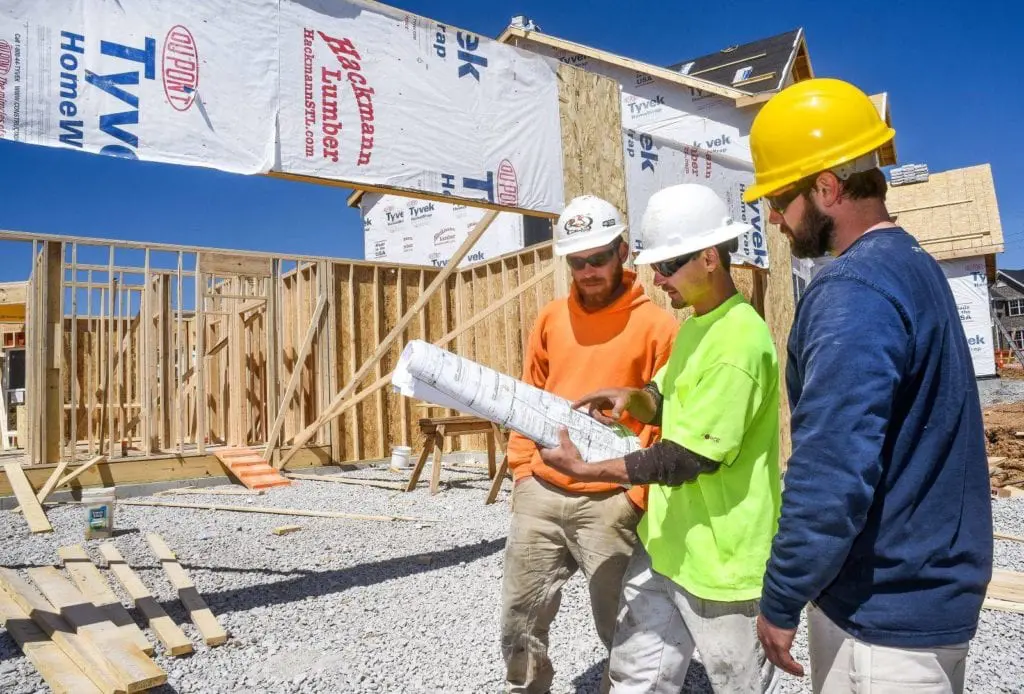
It’s world-renowned for its live country music, piping hot fried chicken, and gorgeous rolling hills – welcome to Tennessee. If you’re a homebuyer moving to the Volunteer State, we’re excited for you! Just make sure you’re saving up for closing costs alongside your down payment.
Closing costs are an umbrella term, encompassing all the administrative and legal fees you’ll need to pay before you receive the keys to your new home. They include paying the various service providers helping you during the homebuying process, including your lender, appraiser, home inspector, insurance provider, and the taxman, just to name a few.
Instead of paying for each service one by one, closing costs are cobbled together and paid in a single sum on closing day. Typically, they amount to about two to five percent of a home’s purchase price.
If you’re buying a new home in Tennessee, NewHomeSource has put together the following guide to help you determine how much you should be saving for closing costs, state-specific rules, and how you can potentially lower the tab.
How Much are Closing Costs in Tennessee?
Closing costs in Tennessee are, on average, $2,080 for a home loan of $189,222, according to a 2021 report by ClosingCorp, which provides research on the U.S. real estate industry. That price tag makes up 1.10 percent of the home’s price tag.
Tennessee has reasonable closing costs, ranking 18th with the lowest closing costs in the country. For comparison’s sake, the national average is $6,087.
But homebuyers in Tennessee should anticipate spending far more than these initial estimates. That’s because ClosingCorp excluded two major closing cost expenses: loan origination fees if you need to take out a home loan; and private mortgage insurance, or PMI, which homebuyers must purchase if their down payment is less than 20 percent. Both expenses can easily add thousands to their closing costs tab.
Home values have also risen, driving up closing costs, too. Home prices statewide were up 23.2 percent year-over-year as of February 2022, with the average median sales price in the state at a whopping $354,700.
But overall, closing costs will fluctuate greatly depending on a handful of factors, such as the price and location of the home, along with your down payment, credit score, and the type of mortgage you secure.
What’s Typically Included in Tennessee’s Closing Costs?
Each state has its own set of rules when it comes to real estate closings, from hiring an attorney to paying for real estate transfer taxes. To help you navigate what to expect, we’ve grouped your closing costs into three fee categories.
Here’s what to expect in Tennessee:
Mortgage-Related Fees
Most people don’t have the cold hard cash on hand to buy their new home outright. This is why the first set of closing cost fees you’ll incur will be mortgage-related to help you set up your home loan. You may also pay for hiring an attorney and escrow agent.
Loan Origination Fees
Whether you’re working with a bank or mortgage broker, you’ll be charged for loan origination fees to set up your mortgage application. This fee includes everything from underwriting your loan to providing preapproval letters for your house hunting to processing your funding by closing.
Loan origination fees are typically about 0.5 percent to 1 percent of the loan amount.
Credit Report Fees
Before a lender offers you any type of credit, including a home loan, they’ll need to conduct a full credit check to make sure you’re a responsible borrower. They’ll pull your credit report from the various credit reporting bureaus for an in-depth look at how you’ve managed previous debts.
Expect your lender to pass on the cost of requesting your credit report to you. If more than one borrower is on the loan application, you’ll need to double this cost.
Private Mortgage Insurance
If you aren’t providing a 20 percent down payment, your lender will expect you to buy private mortgage insurance. This allows borrowers to qualify for a conventional loan even if they put down only five to 19.99 percent. While you’re paying for the insurance, the coverage is for your lender in case of default.
PMI typically ranges from 0.25 to 2.25 percent of your loan. Once you hit the 20 percent mark in home equity, you don’t have to pay for PMI.

Attorney Fees
While some states require buyers to hire a real estate attorney to help with the legal aspects of their closing process, this clause doesn’t apply to homebuyers in Tennessee.
You may still decide to hire a lawyer though, especially if your home purchase is a complex one, such as if you’re buying out of state, or if the property is in foreclosure.
An attorney will draft your purchase agreement, examine your mortgage contract, certify deeds, and review your home insurance and title insurance policies.
Escrow Fees
You may decide to hire a title company — or escrow agent — to help ensure you get to closing day on time, too. Your title company acts as a neutral third party, setting up an escrow account to hold your earnest money deposit, down payment, taxes, and other expenses. This way, the seller won’t receive any funds until both parties meet all their conditions on the sale and the contract is finalized.
Property-Related Fees
Before transferring over your life’s savings to buy your dream home, the property in question needs to clear some pivotal checkpoints. Common property-related fees you’ll be on the hook for include:
Title Search
A key purchase in the homebuying process is the title examination. In this case, a title search involves reviewing historical records like deeds, court records, property indexes, and other record-keeping to ensure the seller’s right to transfer ownership. The last thing you want is to buy a home only to be responsible for any legal issues over ownership or other problems like unpaid taxes, judgments, or ongoing lawsuits.
You’ll need to pay for this step whether you’re buying a brand-new build or an existing home.
Title Insurance
Once the title search is conducted and signed off on, you’ll need to purchase two title insurance policies – an owner’s policy for you, and a lender’s policy. Title insurance protects both parties in case of “defects in title,” which is when something is missed during the title search or there are claims on the property.
Unlike other insurance premiums which need to be paid annually, title insurance is a one-time expense. The insurance applies for as long as you’re the owner of the property.
Real Estate Transfer Tax
Whenever real estate changes hands, buyers and sellers need to account for a transfer tax during closing. The Volunteer State charges $0.37 for every $100 of property, according to the state’s Department of Revenue.
There’s also a mortgage tax of $0.11 for every $100 carried on your home loan. Bear in mind, local municipalities may charge their own transfer taxes and fees for recording the transfer of the deed, too.
Property Appraisal
Before your lender issues your home loan, the property you’re buying must pass an appraisal. In this case, your lender will send a third-party appraiser to assess the property.
This is a make-or-break moment in your homebuying journey – essentially, your lender needs to ensure your potential new home is priced at the right market value. If you default on your loan, it’s your lender that needs to sell the property to recoup its losses.
The appraiser will scan the home, its size, key features, and condition, to compare how it stacks up to similarly priced homes in the neighborhood.
While your lender calls the shots on hiring an appraiser, you’ll foot the bill.

Property Inspection
While an appraiser evaluates whether your new home has the right price tag, you’ll also need to hire a home inspector whose job is to check on the health and safety of your big purchase.
Your home inspector’s job is to examine the home’s condition, from the roof to the foundation, to major appliances, drainage systems, and heating and ventilation.
This step is worth every penny. Take notes when your inspector provides feedback – he or she will flag any issues and repairs you may be inheriting now or down the road. You can bring this intel back to your seller for further negotiations before finalizing the deal.
Annual Fees
Your monthly mortgage bill, utilities, property taxes – homeownership is a matter of staying on top of recurring expenses. Pay attention to these annual fees you’ll need to pay beginning on closing day:
Property Taxes
In Tennessee, homeowners pay about 0.73 percent of their home’s assessed market value in property taxes, according to the Tax Foundation. This amount may be higher or lower because property taxes are collected on a county level, with each region setting its own rate.
Property taxes are a prepaid expense, meaning they need to be paid at closing and can’t be rolled into your home financing. As part of your closing costs, you’ll need to pay for the first six to 12 months.
Homeowner’s Insurance
Home insurance is another mandatory purchase you’ll need to make before your lender agrees to issue your home loan.
By closing, you must have a homeowner’s insurance policy paid for and in effect for the first year. While it’s mandatory, it’s worth it for your peace of mind – home insurance covers any physical damage to your home caused by fire, wind, vandalism, or theft.
You’ll also need to decide if you want to insure expensive heirlooms, artwork, and jewelry.
How Can I Lower my Closing Costs in Tennessee?
Between saving for a down payment and new furniture, you may be looking for ways to lower your closing costs. Here are some key strategies to consider.
Closing Cost Assistance
Closing cost assistance is readily available via state and local homeownership assistance programs. The Tennessee Housing Development Agency, for example, has its Great Choice Home Loan program that comes with down payment and closing cost assistance program for income-eligible first-time homebuyers. Via this program, you can borrow up to 96.5 percent of your new home’s purchase price, so you’ll need to come up with a down payment of just 3.5 percent. The Great Choice Plus program provides another $6,000 in the form of a forgivable second mortgage set at 0 percent interest.
Check on local homeownership programs in your county, too. You may be able to qualify based on income, being a first-time homebuyer, or if you’re moving to a targeted region.
Get Your Finances in Shape
If your credit score is in bad shape, work on boosting it before shopping for a home loan. With a better credit score in hand, you’ll be able to secure a competitive interest rate, saving you thousands over the lifetime of your mortgage.
Apply as much as you can toward your down payment, too. The closer you get to the 20 percent threshold, the less you’ll have to pay in PMI.

Comparison Shop
While some closing cost fees are fixed, such as the appraisal and property taxes, you can shop around for some services, such as your lender, home inspector, and title company.
Take time to compare vendors, ensuring they’re appropriately accredited with glowing reviews from previous customers. With a shortlist in hand, ask for quotes so you can make sure you’re getting the best deal.
Negotiate Lender Fees
If you have a longstanding, established relationship with your lender, you may have some wiggle room with your loan setup fees.
You could ask your lender to omit certain expenses from your bill, such as rate lock fees, loan processing fees, or broker rebates. If that doesn’t work, you could also ask to stagger these expenses, so they’re paid in stages instead of all at once at closing.
Seller Concessions
Don’t shy away from negotiating on who pays for which closing cost expenses with the seller, especially if you’re in a buyer’s market.
Try to reassign some of the closing costs. For example, you can submit a full-price offer with a caveat that the seller must pick up all your closing costs. If you’re building a new home, you could ask the builder to cover your closing costs in exchange for paying for a handful of pricy upgrades.
No-Closing-Cost Mortgages
With a “no-closing-cost” mortgage, your lender agrees to pay for part or all your closing costs, but you must pay a higher interest rate.
Be careful with this option: It could cost you more money overall because of the bump in your interest rate.
Add Closing Costs to Your Home Financing
Aside from the prepaid expenses that must be paid at closing, you could opt to roll your closing costs into your home loan. This could add thousands to your mortgage. You won’t have to pay for closing costs on your big day, but your monthly mortgage payments will be a bit higher.

Carmen Chai is an award-winning Canadian journalist who has lived and reported from major cities such as Vancouver, Toronto, London and Paris. For NewHomeSource, Carmen covers a variety of topics, including insurance, mortgages, and more.
 How to Build a House in South Dakota
How to Build a House in South Dakota